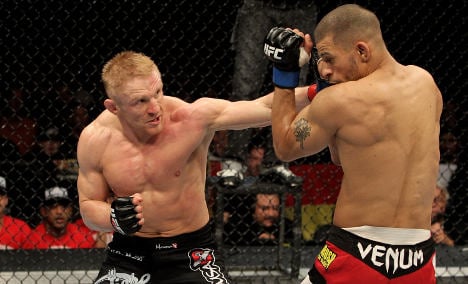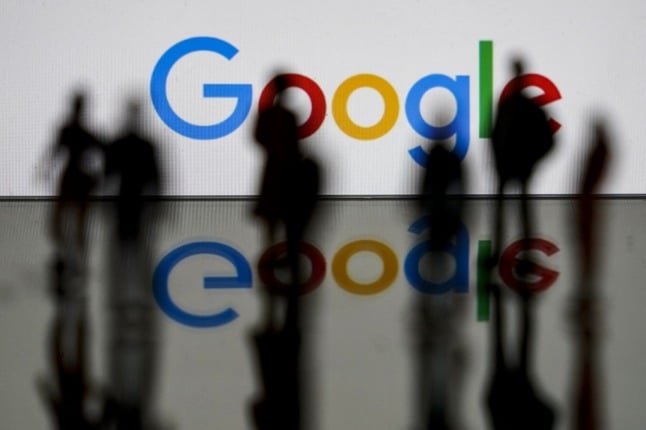Despite being banned from German television for allegedly glorifying violence, the Ultimate Fighting Championship (UFC) brought its brand of mixed martial arts to the western German city of Oberhausen last weekend.
Dennis Siver, a Russian of German heritage, won a dramatic first-round choke submission victory against England’s Andre Winner in front of a near-capacity crowd on Saturday night.
“The reality is that this is a safe sport with incredible athletes and it should be sanctioned here just like everywhere else,” said UFC president Dana White at the post-fight press conference, declaring his organization had “made a statement” by staging the contest in Germany in the face of stiff resistance.
“Our goal is to make this a global sport and we will not give up even if some places take longer than others. We now have ten years of success, a ten-year safety record and have already made a huge economic impact.”
As if to underline White’s claims, the main event middleweight bout between America’s Nate Marquardt and Japan’s Yushin Okami in Oberhausen was far from a blood bath, resembling what adherents of the sport describe as ‘kinetic chess.’ After neutralizing Marquardt’s wrestling skills, Okami produced a masterful boxing display in the final round, using feints, intricate timing and a control of the distance between himself and his opponent to repeatedly score with left and right hand leads, on route to a points victory.
In an earlier undercard bout, Germany’s Pascal Krauss had bolstered his country’s success with a hard-fought unanimous points decision victory over tough Liverpudlian, Mark Scanlon. Glowing in the aftermath of his success at the post-fight press conference, Krauss spoke of his joy at sitting next to such great fighters. “This is like a dream come true,” he said.
Marek Lieberberg, the Frankfurt-based promoter who helped organise the UFC’s second event in Germany, described the night as a “positive step forward” for the Las Vegas-based organization’s presence in the country. “The evening showed a lot of great talent, especially with the success of the German fighters and paves the way for the future of the UFC here,” he said.
German resistance
However, the UFC still has much work to be done before the sport of mixed martial arts (MMA) is widely accepted in Germany. A conference of state sports ministers has called for the end to MMA fights and the German Olympic Association has denied that it can even be classified as a sport.
MMA fighters compete using a variety of different disciplines including boxing, kickboxing, karate, judo, jiu-jitsu, taekwondo, Thai boxing and wrestling. Street-fighting techniques such as eye gouging, head butting and groin attacks are banned, along with a variety of other moves deemed to be too dangerous for the ring.
“The German market is like a lot of markets that do not have any real experience with the sport or the UFC. The challenge is always getting decision makers and the media to understand what the sport is,” Marshall Zelaznik, managing director of international development at the UFC told The Local.
“So many executives and politicians look at it like it was the old UFC where it was basically two guys looking like they have just walked off the street walking into a cage and fighting. Nothing could be further from the truth.”
But Bavaria’s BLM state media watchdog successfully pushed for a ban on broadcasting UFC fights on Germany television, arguing they were spectacles of “massive violence” that “breached taboos,” such as striking a combatant while on the ground.
The UFC’s Zelaznik complained the TV ban “defies logic,” given that other combat sport such as boxing and kickboxing are allowed to be broadcast in Germany. “UFC rules are every bit as stringent as those of boxing. The BLM has found this to be a stalking horse – a political issue – it is no longer based on fact or reason,” he said.
Bloodier than boxing?
While conceding that the hitting of a defenceless grounded opponent can appear disturbing, Zelaznik argued that it is less dangerous than when a stricken boxer is allowed to continue taking more punishment in a bout after being given a count to enable him to recover in the ring.
However, in a robust defence of the broadcast ban, BLM spokeswoman Johanna E. Fell said there was no comparison to other types of fighting.
“We do not think that you can argue that a sport can be allowed merely because it has never resulted in serious or fatal injuries,” she told The Local. “We have yet to see a judo or wrestling fight in which opponents continue to fight each other when one of them is visibly hurt.”
As a result of the TV ban, Saturday night’s event in Oberhausen was only broadcast online in Germany.
“We are not concerned about the levels of violence shown at UFC fights,” said Alexander Marx, the programming director of sports website Spox.com.
“Of course, we acknowledge that the UFC and MMA in general are kind of bloody – but boxing is bloody, too.”



 Please whitelist us to continue reading.
Please whitelist us to continue reading.
Member comments